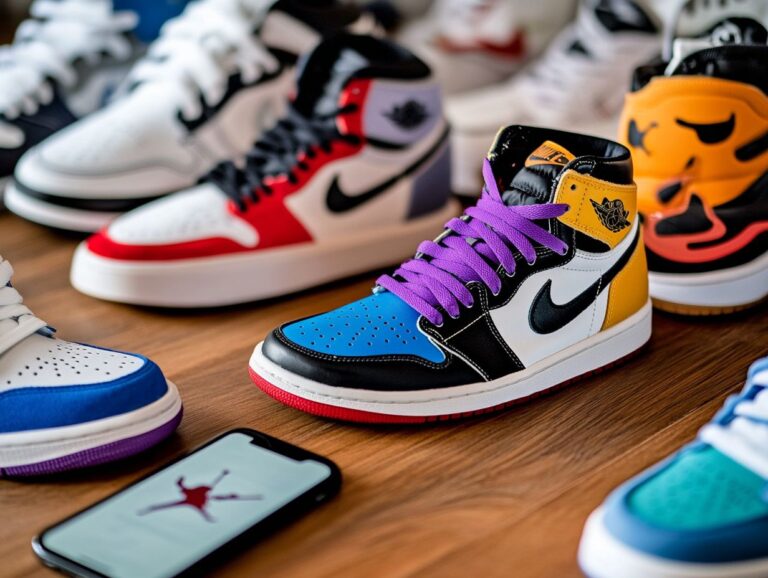How to Save Money Without Feeling Like You’re Missing Out
Managing your finances can feel a bit overwhelming at times, but here’s the thing: understanding your spending habits is the first step on the road to financial freedom.
This article will help you explore practical ways to figure out where your money is going and how to create a budget that actually fits your lifestyle.
You’ll discover tips to cut expenses without giving up the things you enjoy, strategies to maximize your savings and investments, and ways to stay motivated on your financial journey.
So, it’s time to say goodbye to financial stress and hello to smarter money management!
Understanding Your Spending Habits
Understanding your spending habits is a key step in your journey toward financial freedom and taking control of your personal finances. You might find yourself struggling with impulse control and emotional spending, which can really throw a wrench in your financial goals and lead to unnecessary debt.
By taking a closer look at where your money is going, you can craft a budgeting strategy that truly aligns with your values and priorities. This awareness helps you figure out the difference between your needs and wants, leading to better money management and guilt-free saving opportunities.
Identifying Where Your Money Goes
Identifying where your money goes is your first step in transforming your financial habits and making sure your spending aligns with your values. You might be surprised by the power of expense tracking; it can reveal insights about your shopping habits and help you make smarter decisions about your financial planning.
Understanding your cost-benefit analysis lets you see if your spending truly adds value to your life or if it’s just feeding into emotional spending.
To keep an eye on your expenses, you can start by using budgeting apps that make the process super simple and offer user-friendly interfaces for tracking your daily transactions. If you prefer a more hands-on approach, creating personalized spreadsheets can give you a broader view of your spending habits.
By diligently recording your expenses, you’ll start to notice patterns, helping you pinpoint unnecessary costs and prioritize the essentials.
This analysis not only encourages mindful consumption but also promotes a proactive approach to managing your finances, ultimately paving the way for a more sustainable financial future.
Creating a Budget
Creating a budget is a crucial step for you if you’re aiming for financial independence and want to keep your lifestyle balanced. With a solid budget in place, you can direct your funds toward what matters most to you while spotting areas where you could cut back on expenses.
Effective budgeting helps you clarify your financial goals and encourages mindful spending, making sure that any lifestyle changes you make lead to long-term benefits and enjoyment. It’s all about seizing the chance to save while staying true to what you value.
Tips for Setting Realistic Budget Goals
Setting realistic budget goals is key to keeping your motivation high and achieving financial success on your frugal living journey. It’s important for you to take an honest look at your financial situation and make lifestyle changes that truly reflect your values and preferences.
By establishing achievable savings tips, you’ll feel more confident in your spending choices and can better navigate the trade-offs between expenses and experiences.
Make it a habit to regularly review and adjust those goals to keep them relevant to your changing circumstances. This means analyzing your spending habits and pinpointing areas where you can cut back without losing out on enjoyment.
Finding the right balance between leisure and savings is essential; you can definitely treat yourself now and then while staying committed to your long-term financial goals.
Budgeting tools or apps can help you strike that balance, making your financial journey feel more value-driven.
By keeping your goals flexible and in tune with your evolving priorities, you’ll create a sustainable financial roadmap that brings you both fulfillment and security.
Cutting Expenses Without Sacrificing Quality of Life
Cutting expenses without sacrificing your quality of life can be quite the challenge, but it’s one that calls for a bit of creativity and strategic thinking in your financial planning.
By embracing a frugal mindset and making informed choices, you can find that sweet spot where happiness and fulfillment reign without breaking the bank. This journey often means hunting for affordable options and taking a good look at what triggers your spending.
It’s all about making sure that every dollar you spend aligns with your financial goals and personal values.
Ways to Save Money on Everyday Expenses
There are plenty of ways for you to save money on everyday expenses, which can boost your financial stability while still letting you enjoy life. By hunting for discounts, taking advantage of cashback deals, and practicing smart spending habits, you can trim costs without sacrificing your lifestyle.
These strategies not only help you cut expenses but also encourage a value-driven mindset that leads to guilt-free savings and greater financial freedom.
Start by focusing on meal planning and always shopping with a list to avoid those pesky impulse buys at the grocery store. This simple habit ensures you only grab what you actually need.
Regarding utilities, think about switching to energy-efficient appliances and being mindful of how you use them—those small changes can really add up to significant savings over time.
And don’t forget about transportation! Look into carpooling options or using public transit to help lower your fuel costs. By promoting mindful consumption and dedicating a little time to research affordable services, you can carve out a more sustainable financial path while enhancing your overall quality of life.
Alternative Options for Expensive Habits
Exploring alternative options for those expensive habits can really boost your savings while still letting you enjoy life’s little pleasures. Whether it’s finding budget-friendly hobbies, checking out community events, or diving into frugal activities, there are so many ways to have fulfilling experiences without emptying your wallet.
These creative alternatives not only help you practice delayed gratification but also highlight the long-term benefits of prioritizing your financial health over impulsive spending.
For example, instead of hitting up those pricey restaurants, why not host potluck dinners with your friends? Everyone can bring a dish, making it a fun and affordable gathering.
And when it comes to entertainment, skip the costly movie tickets or expensive concerts. Local community centers often have free or low-cost events, like outdoor movie nights or live music in the park, that can be just as enjoyable.
Don’t forget about DIY projects! Transform your weekends by getting crafty—whether you’re making your own home décor or trying your hand at gardening. Not only will these activities spark your creativity, but they’ll also give you a sense of accomplishment while keeping your budget intact.
Maximizing Savings and Investments
Maximizing your savings and investments is key to hitting your financial goals and ensuring long-term independence.
By actively looking for ways to save and making smart investment choices, you can grow your wealth and create a safety net for the future.
This journey might include regularly putting money into a savings account, getting to know the benefits of different investment options, and exploring strategies that give the power to you financially.
Strategies for Growing Your Money
Implementing effective strategies to grow your money is essential in today’s ever-changing financial landscape, where smart spending can lead to some impressive savings. As you dive into your financial planning, consider exploring different investment strategies that match your risk tolerance and financial goals. Maximizing your saving opportunities—whether it’s through high-yield accounts or diversified investments—can really boost your overall financial health.
One strategy you might want to look into is dollar-cost averaging. This approach encourages you to invest regularly, regardless of market fluctuations, which helps reduce the impact of volatility on your portfolio. Plus, utilizing retirement accounts like 401(k)s or IRAs can offer some sweet tax advantages while you’re saving for the future.
Don’t forget to actively seek out financial education resources like books, podcasts, and online courses to deepen your understanding of these investment concepts. By give the power toing yourself with knowledge, you’ll find that achieving financial literacy becomes much more attainable, leading to knowledge-based decision making that could deliver impressive long-term returns.
Staying Motivated to Save
Staying motivated to save can be tough, especially when emotional spending and the temptation of instant gratification come knocking.
To keep your financial goals front and center, why not try participating in savings challenges or create visual reminders that inspire you?
By nurturing a positive mindset about saving and celebrating those little milestones along the way, you’ll reinforce the idea that saving can lead to greater financial freedom and a better quality of life.
Rewarding Yourself for Achieving Savings Goals
Rewarding yourself for hitting those savings goals is super important for keeping your motivation high and maintaining a healthy relationship with your finances. Celebrating milestones—no matter how small—can really help reinforce your commitment to mindful spending and financial give the power toment.
By allowing yourself to enjoy those guilt-free rewards, you strike a nice balance between saving for the future and enjoying the present, which makes for a more fulfilling financial journey.
To make this rewarding experience even better, think about setting aside a specific percentage of your savings for personal treats. This could be anything from:
- Spending a delightful day at a local park
- Organizing a cozy movie night at home with your favorite snacks
- Indulging in that meal you’ve been craving
The trick is to choose rewards that genuinely resonate with you and pump up your enthusiasm. By doing this, you add a little joy to your financial discipline, making sure that every effort you put into saving feels worthwhile and keeps that momentum going toward your bigger financial goals.
Tracking Progress and Celebrating Milestones
Tracking your progress and celebrating milestones is crucial for keeping the momentum going on your journey to financial give the power toment and mastering those savings tips. By regularly reviewing your budget and taking the time to celebrate your achievements, you’ll reinforce those positive behaviors and stay committed to your financial planning. This proactive approach helps you become more aware of your spending habits and encourages long-term success in reaching your financial goals.
There are plenty of ways you can effectively track your savings progress. Using budgeting apps is a super convenient option for monitoring your expenses and setting savings targets, giving you real-time updates on your financial status.
If you’re more of a visual person, creating charts can really enhance the tracking experience, providing a tangible representation of your progress. And when you hit those milestones, it’s important to celebrate in a way that feels right for you—whether that’s treating yourself to a little something, enjoying a fun day out, or simply recognizing the hard work you’ve put into reaching those goals.
This practice not only boosts your motivation but also helps align your financial achievements with your personal values.




